It really is possible to enjoy growing orange trees no matter what type of climate you live in. Just grow them in containers!
People typically associate oranges with large groves of trees with row after row of bright fruit. They are usually found in warmer climates like California, Florida, Texas, or even Arizona.
However, you can grow orange trees even if you live in the cold midwest or in locations that can see below-zero temperatures. To do this, you simply need to grow the orange trees in containers.
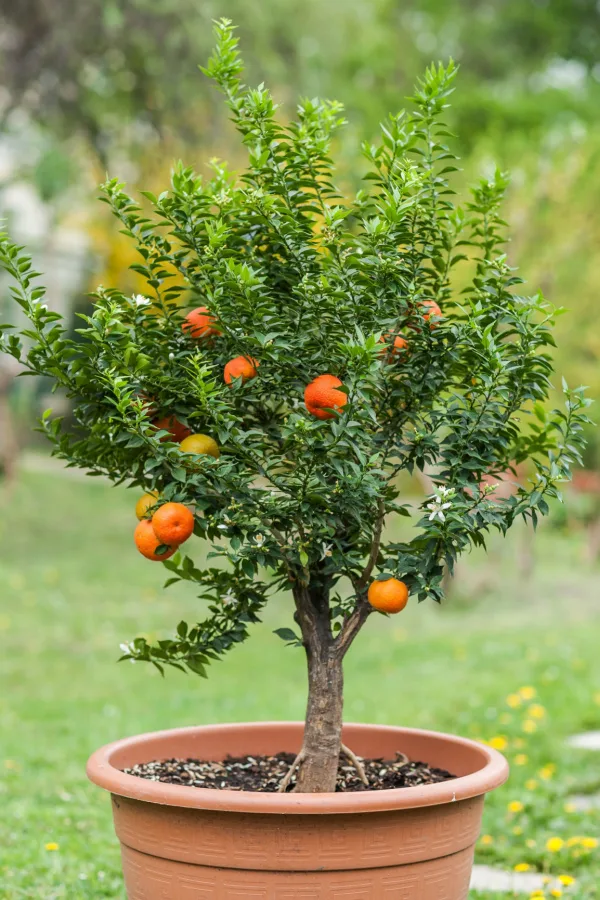
Keep them outside during the warmer months so they can bloom and get pollinated, then bring them indoors if it gets too cold. Not only will you get the advantages of delicious, tangy fruit at your fingertips, but you will also get to enjoy the amazing scent of their blossoms as well.
Growing orange trees in containers also allow you to keep the trees in smaller spaces like on your back deck, balcony, or even on porches. The possibilities are almost endless when it comes to growing orange trees in containers!
Best Cultivators For Container Growing
When it comes to growing orange trees in pots and containers, you need to make sure you are choosing the right variety of plants. Not all varieties will thrive in the confined space of a container, so be sure to do your research before purchasing.
4 Great Cultivators
Red Navel Orange Tree – Produces large fruit that can be eaten or juiced. They grow between 7 to 10 feet tall and about 3 to 4 feet wide. They are hardy in zones 8-11.
Calamondin Orange Tree – Features smaller fruit and only grows to a size of around 6 to 8 feet tall. They are a cross between mandarin oranges and kumquats. Calamondin orange trees are hardy in zones 8-11, but their smaller size makes them perfect for indoor growing in the winter for locations out of those zones. They are also great for keeping their fruit for almost a year.
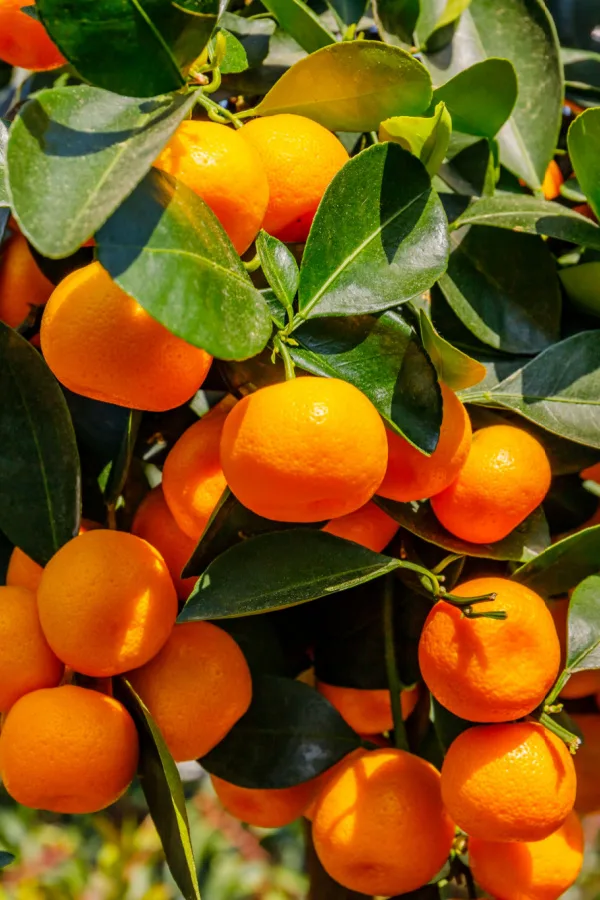
Clementine Mandarin Orange Tree – These container trees produce those easy-to-peel clementines that are perfect for snacking. They are hardy in zones 9-11 and grow to a height of around 10 to 12 feet. With proper pruning, however, you can keep them smaller.
Cara Cara Orange Tree – These oranges feature pink-colored flesh with a sweet navel orange flavor. When grown as container plants, they stay around 4 to 6 feet tall and can be brought indoors when grown outside of their 9 to 11 growing zone in the colder months.
How To Plant, Grow, And Maintain Container Orange Trees
Planting Tips
Choosing Your Container
If you are starting an orange tree from seeds or a cutting, you can use any size of a container to start. However, since trees are slow growing and will take several years before they produce fruit, most people purchase trees as bare roots that are already a few years old and a few feet tall. This allows them to have a head start on the growing and fruiting process.
For bare root trees, choose a container that is at least 5 gallons or larger. Bigger is definitely better when it comes to growing trees. Ensure that your container has several drainage holes, just like you would with any potted plant.
Consider attaching some caster wheels, dolly cart, or another way of transporting your container if it is going to need to be brought indoors during the winter. It’s a lot easier to do this now before adding your soil and tree!
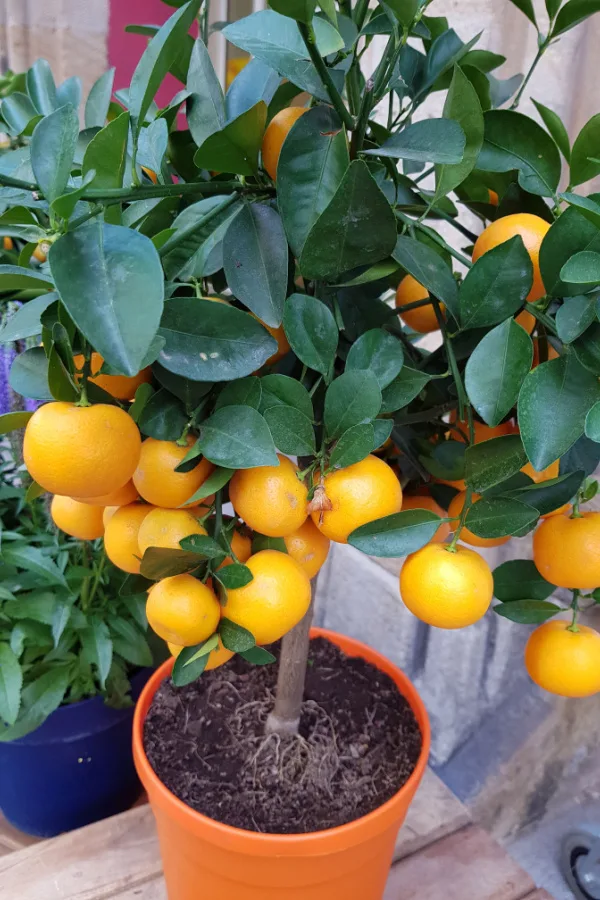
Planting
The most important part when it comes to potting soil for orange trees is that it is well-draining. Any type of commercial potting mix should work well. You can also make your own as well. Be sure to add plenty of aged compost.
Put a few inches of potting soil into your container and then add the bare root tree. Be sure to keep the graft above the soil line. Add the rest of the potting soil, ensuring that you are keeping the trunk nice and straight.
Pack the soil around the roots as you go to make sure you have removed as many of the air pockets as possible. Water well to help settle the soil.
Spring Through Fall Care – Growing Orange Trees In Containers
Outdoor Location
Orange trees require full sun in order to really flourish. Anywhere between 6 to 8 hours of direct sunlight is best, especially during the growing season. Keep trees out of locations that receive high winds since the containers can be tipsy once the tree gets to mature size.
Watering
Orange trees benefit from a good, deep watering once or twice a week during the active growing season. Depending on your growing medium and the outside temperatures, that means you might be watering once or twice a week. Wait until the top several inches are dry before watering deeply.
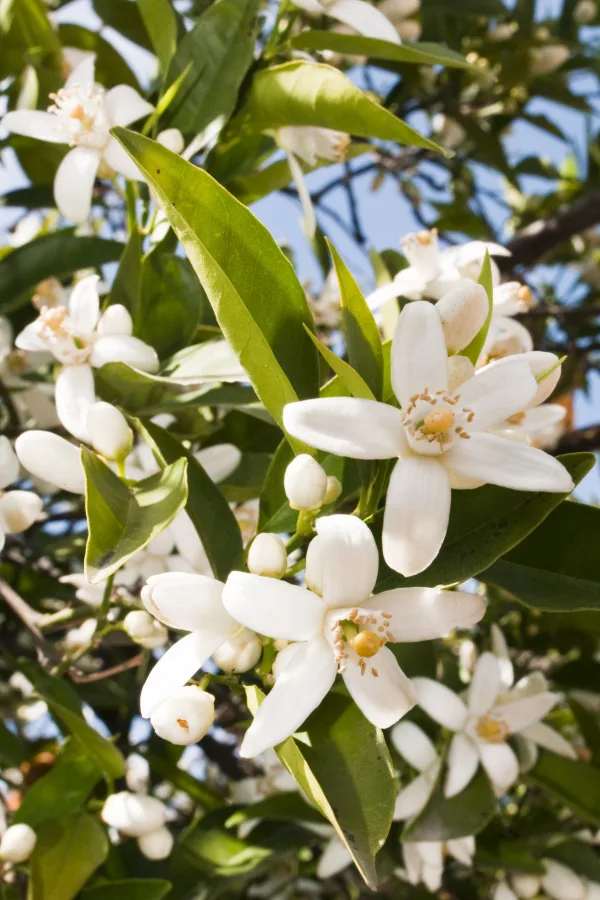
Fertilizing
In late winter, you can give your orange tree a dose of fertilizer to help with blooming. You can also apply a second dose after blooming has occurred to give the fruit a nice feeding before growing.
Any liquid or granular fertilizer works well as long as there is a good amount of nitrogen in the ratio. You can even find commercial fertilizers that are specific to citrus fruits. (Product Link: Espoma Organic Citrus-tone Fertilizer)
Pruning & Repotting
Doing a light pruning is a great way to keep your orange tree from getting too large and out of control. Remove any dead or damaged stems and thin out inside branches to help make sure all branches can easily get sunlight. Do the pruning in late winter so you don’t remove any new growth.
You should also do any repotting in the late winter or very early spring months. Choose a new container that is several inches wider than the current one.
Winter Care – Growing Orange Trees In Containers
Your location will depend on how you care for your growing container orange tree during the winter months. Ideal growing temperatures for orange trees are between 50 to 100º Fahrenheit (10 to 38º Celsius). If it falls below that during the year you will need to bring indoors.
Warmer Climates
Most orange trees are only hardy in zones 9 through 11. In these locations, you can continue to keep the tree outdoors in a sunny location. Reduce the amount of watering and protect trees from the occasional cold spell or frost with blankets if needed.
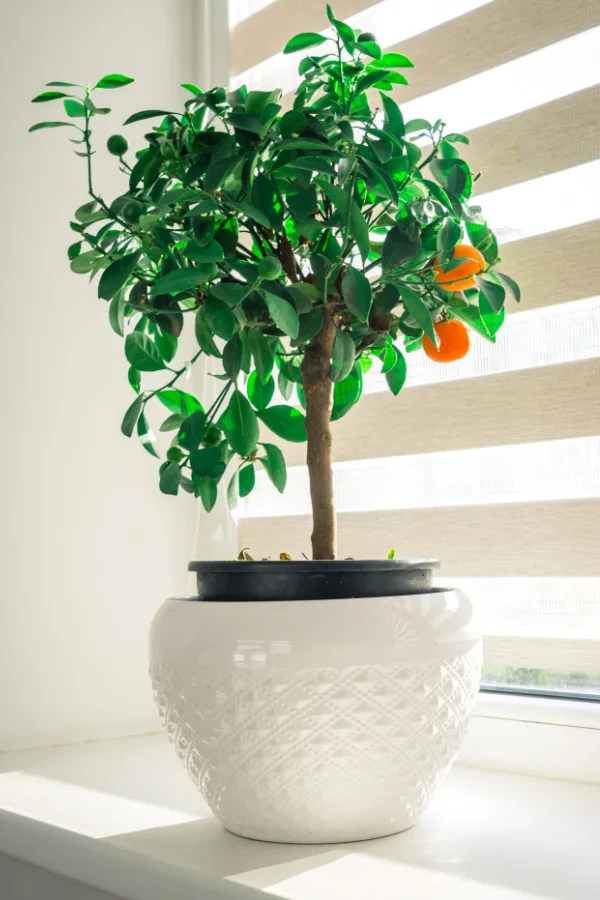
Cooler Climates
If your temperatures start to dip below 50º, it’s time to start bringing your orange tree indoors for the winter season. Choose a location in your home that has a bright, south-facing window. If needed, you can use grow lights to help supplement lighting. Ensure that the location is draft free and away from heating vents.
Reduce watering during the winter but increase the humidity for best results. You can use a cool-mist humidifier or place other houseplants or indoor trees nearby to help raise the humidity levels.
Follow Our Facebook Page For Even More Great Tips! Simple Garden Life Facebook Page
Simple Garden Life is a website dedicated to keeping gardening fun, simple and enjoyable! We publish two new articles each week along with a new garden podcast episode every two weeks. This article may contain affiliate links.
